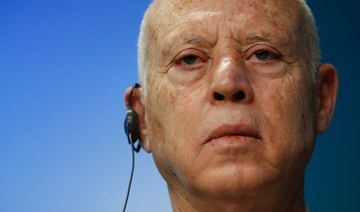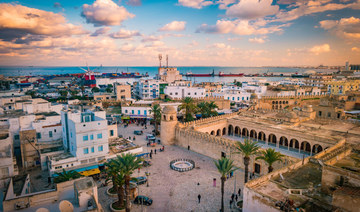TUNIS: Tunisian President Kais Saied, who last year grabbed power in what critics labelled a coup, has now asked voters for their political views — but days before the online poll closes, fewer than six percent had taken part.
Most people in the small North African country are more concerned with food shortages, unemployment and financial woes than in joining in the process to help rewrite the constitution.
The online questionnaire was launched in January, more than half a year after Saied sacked the government, froze parliament and seized near-total power in a decisive blow against the country’s political elite.
The results are to be presented to a committee of experts — hand-picked by Saied — who will then draft a new constitution ahead of a referendum in July.
But with just days to go until the portal closes on Sunday evening, only 412,000 people — under six percent of the seven-million-strong electorate — had taken part.
“It’s clear that there’s a lack of interest in this consultation,” said analyst Hamza Meddeb. “The timing wasn’t well thought-out.”
Saied’s July power grab abruptly suspended the mixed presidential-parliamentary system enshrined in Tunisia’s 2014 constitution, a hard-won compromise between rival ideological camps reached three years after a revolt toppled dictator Zine El Abidine Ben Ali.
Tunisia has often been praised abroad as the only democracy to emerge from the Arab Spring uprisings.
But many Tunisians have long become disillusioned with a political class seen as corrupt and incompetent, meaning Saied’s move initially sparked a wave of support.
Meddeb believes that if the consultation had taken place immediately, participation could have been much higher.
But seven months on, he said, “the president has shown that he didn’t have a project or a program to improve Tunisians’ daily lives.”
In the streets of Tunis, few people seem interested in the exercise.
Saied “just wants to use the public to achieve his own goals,” said shop-owner Safia.
Her colleague Hassen agreed.
“People are sinking into poverty and despair and Saied keeps telling us about the political regime,” he said. “We’re really tired.”
Tunisia is locked in a grinding economic crisis which began long before the coronavirus pandemic sparked mass job losses and the war in Ukraine threatened to exacerbate shortages of basic goods.
Years of high unemployment and inflation have left many families struggling to get by — and with little interest in high politics.
As the consultation draws to a close, stalls have appeared in Tunis to encourage citizens to do their “national duty” and fill in the form, which covers politics, the economy, social problems, health and other issues.
Saied also ordered Prime Minister Najla Bouden to make Internet access free for the final 10 days of the consultation finishing on March 20.
Sarra, a 32-year-old civil servant, said it was “good to try and gather people’s opinions then put the necessary reforms in place.”
But many other Tunisians are skeptical.
“People are dying of hunger but all they care about is the consultation,” one wrote online.
Some asked by AFP said they were not even aware of the exercise — despite an information campaign on national television, even during religious programs.
“They should have come and looked for us on Instagram, Facebook and Twitter,” said student Wajdi.
Saied, accused by his rivals of wanting to bring autocracy back to Tunisia, has made no secret of wanting to install a more presidential regime.
The Islamist-inspired Ennahdha party and several other political blocs have called for a boycott of the consultation.
Ennahdha’s arch-enemy, staunchly anti-Islamist lawyer and Free Destourian Party chief Abir Moussi, has also accused Saied of using state resources for his personal political project.
The exercise has received little support from civil society groups.
Meddeb said the president had “not built a coalition” to bring his project to fruition.
“Kais Saied doesn’t represent change any more, he’s just busy opening new fronts” against his political rivals, he said.
“He moves forward alone, maps out his route alone and is deciding the fate of the country alone.”
Tunisians snub poll on reforms as economic crisis bites
https://arab.news/w7q36
Tunisians snub poll on reforms as economic crisis bites
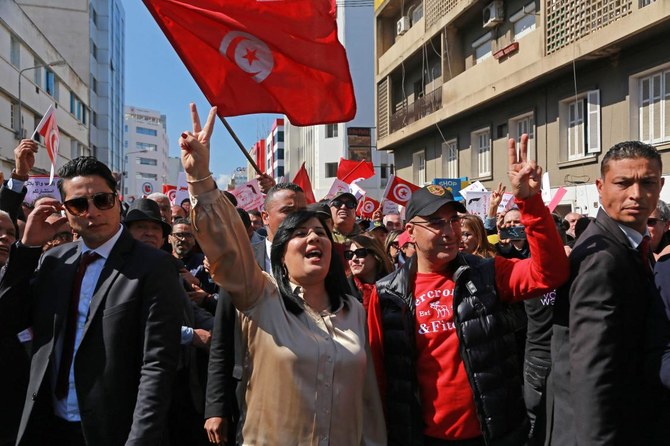
- Most people in the small North African country are more concerned with food shortages, unemployment and financial woes
- "It's clear that there's a lack of interest in this consultation," said analyst Hamza Meddeb
Israel attacks Rafah after Hamas claims responsibility for deadly rocket attack
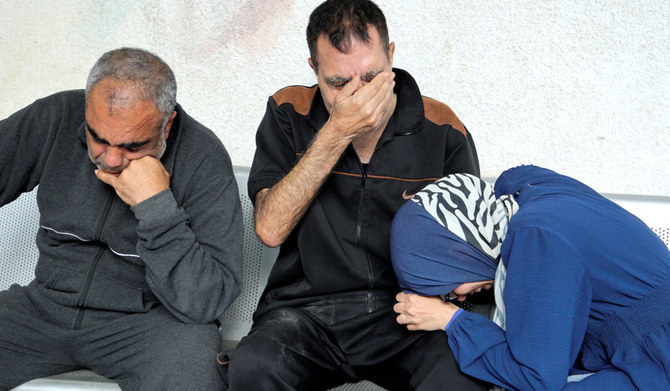
- Hamas claims attack on Kerem Shalom crossing into Gaza that Israel says killed three soldiers
- Sunday's attack on the crossing came as hopes dimmed for ceasefire talks underway in Cairo
CAIRO: Three Israeli soldiers were killed in a rocket attack claimed by Hamas armed wing, near the southern Gaza Strip city of Rafah, where Palestinian health officials said at least 19 people were killed by Israeli fire on Sunday.
Hamas's armed wing claimed responsibility on Sunday for an attack on the Kerem Shalom crossing into Gaza that Israel said killed three of its soldiers.
Israel's military said 10 projectiles were launched from Rafah in southern Gaza towards the area of the crossing, which it said was now closed to aid trucks going into the coastal enclave. Other crossings remained open.
Hamas' armed wing said it fired rockets at an Israeli army base by the crossing, but did not confirm where it fired them from. Hamas media quoted a source close to the group as saying the commercial crossing was not the target.
More than a million Palestinians are sheltering in Rafah, near the border with Egypt.
Shortly after the Hamas attack, an Israeli airstrike hit a house in Rafah killing three people and wounding several others, Palestinian medics said.
The Israeli military confirmed the counter-strike, saying it struck the launcher from which the Hamas projectiles were fired, as well as a nearby "military structure".
"The launches carried out by Hamas adjacent to the Rafah Crossing ... are a clear example of the terrorist organisation's systematic exploitation of humanitarian facilities and spaces, and their continued use of the Gazan civilian population as human shields," it said.
Hamas denies it uses civilians as human shields.
Just before midnight, an Israeli air strike killed nine Palestinians, including a baby, in another house in Rafah, Gaza health officials said. They said the new strike increased the death toll on Sunday to at least 19 people.
Israel has vowed to enter the southern Gaza city and flush out Hamas forces there, but has faced mounting pressure to hold fire as the operation could derail fragile humanitarian efforts in Gaza and endanger many more lives.
Sunday's attack on the crossing came as hopes dimmed for ceasefire talks under way in Cairo.
The war began after Hamas stunned Israel with a cross-border raid on Oct. 7 in which 1,200 people were killed and 252 hostages taken, according to Israeli tallies.
More than 34,600 Palestinians have been killed, 29 of them in the past 24 hours, and more than 77,000 have been wounded in Israel's assault, according to Gaza's health ministry.
Israel attacks Rafah after Hamas claims responsibility for deadly rocket attack
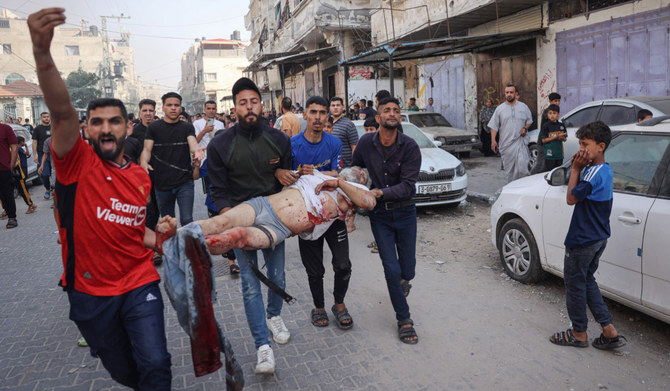
- Israel has killed more than 34,600 Palestinians, according to Gaza’s Health Ministry
CAIRO: Three Israeli soldiers were killed in a rocket attack claimed by Hamas armed wing, near the southern Gaza Strip city of Rafah, where Palestinian health officials said at least 19 people were killed by Israeli fire on Sunday.
Hamas's armed wing claimed responsibility on Sunday for an attack on the Kerem Shalom crossing into Gaza that Israel said killed three of its soldiers.
Israel's military said 10 projectiles were launched from Rafah in southern Gaza towards the area of the crossing, which it said was now closed to aid trucks going into the coastal enclave. Other crossings remained open.
Hamas' armed wing said it fired rockets at an Israeli army base by the crossing, but did not confirm where it fired them from. Hamas media quoted a source close to the group as saying the commercial crossing was not the target.
More than a million Palestinians are sheltering in Rafah, near the border with Egypt.
Shortly after the Hamas attack, an Israeli airstrike hit a house in Rafah killing three people and wounding several others, Palestinian medics said.
The Israeli military confirmed the counter-strike, saying it struck the launcher from which the Hamas projectiles were fired, as well as a nearby "military structure".
"The launches carried out by Hamas adjacent to the Rafah Crossing ... are a clear example of the terrorist organisation's systematic exploitation of humanitarian facilities and spaces, and their continued use of the Gazan civilian population as human shields," it said.
Hamas denies it uses civilians as human shields.
Just before midnight, an Israeli air strike killed nine Palestinians, including a baby, in another house in Rafah, Gaza health officials said. They said the new strike increased the death toll on Sunday to at least 19 people.
Israel has vowed to enter the southern Gaza city and flush out Hamas forces there, but has faced mounting pressure to hold fire as the operation could derail fragile humanitarian efforts in Gaza and endanger many more lives.
Sunday's attack on the crossing came as hopes dimmed for ceasefire talks under way in Cairo.
The war began after Hamas stunned Israel with a cross-border raid on Oct. 7 in which 1,200 people were killed and 252 hostages taken, according to Israeli tallies.
More than 34,600 Palestinians have been killed, 29 of them in the past 24 hours, and more than 77,000 have been wounded in Israel's assault, according to Gaza's health ministry.
Netanyahu uses Holocaust ceremony to brush off international pressure against Gaza offensive

- The ceremony ushered in Israel’s first Holocaust remembrance day since the Oct. 7 Hamas attack that sparked the war, imbuing the already somber day with additional meaning
JERUSALEM: Israeli Prime Minister Benjamin Netanyahu on Sunday rejected international pressure to halt the war in Gaza in a fiery speech marking the country’s annual Holocaust memorial day, declaring: “If Israel is forced to stand alone, Israel will stand alone.”
The message, delivered in a setting that typically avoids politics, was aimed at the growing chorus of world leaders who have criticized the heavy toll caused by Israel’s military offensive against Hamas militants and have urged the sides to agree to a ceasefire.
Netanyahu has said he is open to a deal that would pause nearly seven months of fighting and bring home hostages held by Hamas. But he also says he remains committed to an invasion of the southern Gaza city of Rafah, despite widespread international opposition because of the more than 1 million civilians huddled there.
“I say to the leaders of the world: No amount of pressure, no decision by any international forum will stop Israel from defending itself,” he said, speaking in English. “Never again is now.”
Yom Hashoah, the day Israel observes as a memorial for the 6 million Jews killed by Nazi Germany and its allies in the Holocaust, is one of the most solemn dates on the country’s calendar. Speeches at the ceremony generally avoid politics, though Netanyahu in recent years has used the occasion to lash out at Israel’s archenemy Iran.
The ceremony ushered in Israel’s first Holocaust remembrance day since the Oct. 7 Hamas attack that sparked the war, imbuing the already somber day with additional meaning.
Hamas militants killed some 1,200 people in the attack, making it the deadliest violence against Jews since the Holocaust.
Israel responded with an air and ground offensive in Gaza, where the death toll has soared to more than 34,500 people, according to local health officials, and about 80 percent of Gaza’s 2.3 million people are displaced. The death and destruction has prompted South Africa to file a genocide case against Israel in the UN’s world court. Israel strongly rejects the charges.
On Sunday, Netanyahu attacked those accusing Israel of carrying out a genocide against the Palestinians, claiming that Israel was doing everything possible to ensure the entry of humanitarian aid to the Gaza Strip.
The 24-hour memorial period began after sundown on Sunday with a ceremony at Yad Vashem, Israel’s national Holocaust memorial, in Jerusalem.
There are approximately 245,000 living Holocaust survivors around the world, according to the Claims Conference, an organization that negotiates for material compensation for Holocaust survivors. Approximately half of the survivors live in Israel.
On Sunday, Tel Aviv University and the Anti-Defamation League released an annual Antisemitism Worldwide Report for 2023, which found a sharp increase in antisemitic attacks globally.
It said the number of antisemitic incidents in the United States doubled, from 3,697 in 2022 to 7,523 in 2023.
While most of these incidents occurred after the war erupted in October, the number of antisemitic incidents, which include vandalism, harassment, assault, and bomb threats, from January to September was already significantly higher than the previous year.
The report found an average of three bomb threats per day at synagogues and Jewish institutions in the US, more than 10 times the number in 2022.
Other countries tracked similar rises in antisemitic incidents. In France, the number nearly quadrupled, from 436 in 2022 to 1,676 in 2023, while it more than doubled in the United Kingdom and Canada.
“In the aftermath of the October 7 war crimes committed by Hamas, the world has seen the worst wave of antisemitic incidents since the end of the Second World War,” the report stated.
Netanyahu also compared the recent wave of protests on American campuses to German universities in the 1930s, in the runup to the Holocaust. He condemned the “explosion of a volcano of antisemitism spitting out boiling lava of lies against us around the world.”
Nearly 2,500 students have been arrested in a wave of protests at US college campuses, while there have been smaller protests in other countries, including France. Protesters reject antisemitism accusations and say they are criticizing Israel. Campuses and the federal government are struggling to define exactly where political speech crosses into antisemitism.
Hezbollah fires rockets at Israel after south Lebanon strike kills 4 members of family

- Shells fall on Kiryat Shmona and reach northern Golan
- Maronite Patriarch Bechara Al-Rahi calls for end to war in southern Lebanon
BEIRUT: An Israeli airstrike killed four members of a family in a border village in southern Lebanon on Sunday, security sources said.
Hezbollah, in retaliation, fired Katyusha rockets at the northern Israeli town of Kiryat Shmona, close to the Lebanese border.
The four family members killed in Mays Al-Jabal were identified as Fadi Hounaikah and Maya Ali Ammar, and their sons Mohammed, 21, and Ahmad, 12.
The attack occurred when the family took advantage of a de-escalation of hostilities between Hezbollah and Israel to return to their properties to assess damage and move goods from their supermarket to a location outside the village.

A security source in the area told Arab News that while the family was gathering their groceries from the supermarket, an Israeli military drone spotted them and launched an attack, destroying the area and killing all the members of the family and injuring several civilians in the vicinity.
The source clarified that villages in the area were empty because “residents fled the area seven months ago.”
He added: “When residents want to enter these villages to attend victims’ funerals, they send their names and car number plates to the Lebanese Army and UNIFIL, who in turn coordinate with the Israeli side to spare these funerals (from attack).
“In general, people cannot enter border villages without taking into consideration the Israeli danger, as Israeli reconnaissance planes and drones are hovering over the area 24/7. However, what Israel committed against this family is a terrible massacre.”
Hezbollah responded to the incident by launching dozens of Katyusha and Falaq missiles at Israel. The group said the operation was “in response to the crime committed by Israel in the Mays Al-Jabal village.”
The Israeli Upper Galilee Regional Council announced that missiles hit buildings in Kiryat Shmona, while Israeli Army Radio reported that some of the rockets fell inside the city, causing a power outage.
An Israeli army spokesman reported that 65 rockets were launched from southern Lebanon toward Israeli settlements in the Upper Galilee region.
Meanwhile, Israeli airstrikes hit the villages of Al-Adissa and Kafr Kila, while artillery shelling hit the village of Aitaroun.
Maronite Patriarch Bechara Al-Rahi in his Sunday sermon called for an end to the war in southern Lebanon, urging an end to the “demolition of homes, the destruction of shops, the burning of the land and its crops, and the killing and displacement of innocent civilians and the destruction of their livelihood in an economic condition that has already impoverished them.”
Mohammed Raad, leader of Hezbollah’s parliamentary bloc, meanwhile, expressed his disapproval of the West’s backing for Israel.
He said that Israel “faces no international deterrent. On the contrary, some support it in committing crimes.”
He accused those who support Israel of being “hypocrites and liars who falsely claim to champion human rights, civilization, and progress in the West, (yet) they provide Israel with financial aid, weapons, smart bombs, and a continuous air bridge.”
Raad concluded: “We are not afraid of Israel’s insanity. We are prepared to confront them directly. We are prepared to sacrifice and shed blood to protect our homeland, independence, and honor.”
UNRWA chief says again barred entry to Gaza by Israel

- “Just this week, they have denied — for the second time — my entry to Gaza where I planned to be with our UNRWA colleagues including those on the front lines”: Lazzarini
JERUSALEM: The head of the UN agency for Palestinian refugees, UNRWA, said Sunday that Israeli authorities had barred him from entering Gaza for a second time since the Israel-Hamas war started on October 7.
“Just this week, they have denied — for the second time — my entry to Gaza where I planned to be with our UNRWA colleagues including those on the front lines,” Philippe Lazzarini wrote on X, formerly Twitter.
Lazzarini has been to Gaza four times since the war broke out including on March 17.
“The Israeli authorities continue to deny humanitarian access to the United Nations,” he said on Sunday.
“Only in the past two weeks, we have recorded 10 incidents involving shooting at convoys, arrests of UN staff including bullying, stripping them naked, threats with arms & long delays at checkpoints forcing convoys to move during the dark or abort,” Lazzarini said.
He also called for an “independent investigation” into rocket fire that led to the closure of a key Israel-Gaza aid crossing.
Hamas’s armed wing, Ezzedine Al-Qassam Brigades, claimed responsibility for the Sunday launch, saying militants had targeted Israeli troops in the area of Kerem Shalom crossing.



